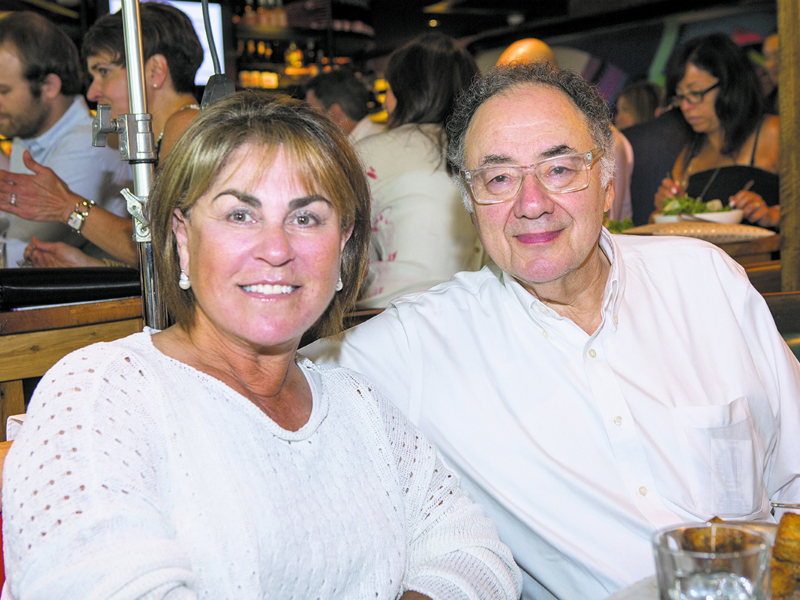Of Toronto’s 65 homicides in 2017, the final two continue to shock the community.
The bodies of Barry Sherman, 75, the founder of the generic drug company Apotex, and his wife Honey, 70, were discovered in their home on Dec. 15, 2017, just hours before the onset of Shabbat. The billionaire couple and philanthropic powerhouses had been the victims of a “targeted” attack, it was established, after some brief but wild speculation about a suicide pact.
In Toronto’s Jewish community – and in the rest of the country – the disbelief has barely waned and questions have persisted: How could this happen? And why?
A year later, there has been no breakthrough in the case, at least nothing that the public is aware of. In October, the family offered a reward of up to $10 million for information leading to the apprehension and prosecution of those responsible for the crime.
At the same time, Brian Greenspan, the lawyer representing the family, took the Toronto Police Service to task, saying it had failed to meet professional standards in its early handling of the investigation.
Much drama has played out over the last year, with sensational reports of shady business dealings, ongoing family feuds, tangled lawsuits and intrigue on a global scale.
Lost in the media frenzy has been the Shermans’ legacy and how their names and memories will continue to enhance Jewish institutions for generations to come. Famously generous, the couple gave tens of millions of dollars to health care, education, politics, Holocaust remembrance and Israeli organizations.
At the couple’s funeral, their son, Jonathon Sherman, pledged that the next generation would continue to build on his parents’ legacy of “loving life, caring for others and knowing, as our parents always reminded us, that with great privilege comes enormous responsibility.”
Jonathon Sherman and his three sisters, Lauren, Alexandra and Kaelen, announced the creation of the Honey and Barry Foundation of Giving. The Shermans’ children declined The CJN’s requests for interviews and a search shows no evidence that the foundation was ever set up.
Still, there’s no shortage of projects that will carry the Sherman name and philosophy of giving well into the future.
READ: BARRY AND HONEY SHERMAN’S SPIRIT AND GENEROSITY TOUCHED ALL OF US
Perhaps the single biggest beneficiary of their largesse was UJA Federation of Greater Toronto. In October 2017, the couple attended the groundbreaking of their namesake project that is finally slated to open in early 2020: the Sherman Campus on Bathurst Street, just north of Sheppard Avenue, in Toronto, will see an expanded Jewish community centre and the Honey & Barry Community Park.
Spread over two acres, the park will host summer and winter camps, specialty markets, family nature outings and community celebrations, according to UJA Federation. The Shermans’ children have set up a fund to match all donations to the park campaign.
The campus, which will replace the Bathurst Jewish Community Centre that was torn down in 2009, will also house the Sheff Family Building, which will expand the Prosserman JCC. The 105,000-sq.-ft. facility will feature indoor pools, steam rooms and saunas, community program rooms, fitness studios, cardio and weight training areas, a full basketball court, running track, multi-purpose theatre and a kosher café with seating.
As well, outdoor spaces are being redeveloped to include sports courts, a pool, a splash pad and a walking trail.
Originally, the plans also called for a 9,000-sq.-ft. Jewish Heritage and Holocaust Education Centre and Museum. Officials are engaged in a “thoughtful consultative process” to determine the best location for the centre, said Dara Solomon, executive director of the Sarah and Chaim Neuberger Holocaust Education Centre.
Since March 2015, $55 million has been raised for Phase 2 of the campus, with fundraising led by Sherman family friend Fred Waks. The amount includes just over $10 million from the federal government’s Building Canada Fund.
At the couple’s funeral, employees of Apotex, the pharmaceutical manufacturer Barry Sherman founded in 1974, wore blue T-shirts with the message, “We will continue your legacy,” written on the back.
The Sherman family wanted to commemorate the date of the deaths “in a fitting and meaningful way,” said Apotex spokesperson Jordan Berman, and asked that staff be given one extra day off in December to spend as they see fit.
Flags at Apotex facilities around the globe will be at half-mast, Berman added.
More concretely, the Apotex Foundation, which was set up in 1984 to distribute life-saving medicines around the world, has supported a variety of organizations and causes over the past year.
They include: the Teasdale-Corti Foundation, which supports Lacor Hospital in Uganda, and Bridge to Health, a Canadian group that provides medical and dental services to underserved areas of Uganda;
Health Partners International of Canada, which was conducting relief efforts in Kerala, India, following devastating flooding; the Strengthening Health Outcomes for Women and Children program in Haiti; Toronto’s Covenant House; and the recent completion of the company’s annual United Way campaign, which was “an important cause for the Shermans,” Berman said.
A separate entity called the Sherman Foundation was founded in 1999. Figures show that last year, it distributed just over $5 million.
Another major recent announcement on the scientific front came from Weizmann Canada, which raises funds for Israel’s Weizmann’s Institute of Science. The Sherman children have made a “major gift” in their father’s honour, to establish the Dr. Barry Sherman Institute for Medicinal Chemistry at Weizmann.
The initiative is expected to have “significant” benefits for a range of disorders, including cancer, as well as autoimmune and neurodegenerative disorders, and infectious diseases, Weizmann Canada’s announcement said. Developing new antibiotics, plant-based drugs to combat Parkinson’s disease and inexpensive anti-malaria medicines are also priorities.
The Shermans were also heavily involved with Baycrest Health Sciences. Within days of the couple’s murder, the institution established the Honey and Barry Sherman Memorial Fund. “The community has been very generous” in supporting the fund “and we will ensure that the funds will be put towards the current Apotex Centre, Jewish Home for the Aged,” said Baycrest spokesperson Michelle Petch Gotuzzo.
At Mount Sinai Hospital, which has received $10 million from the family over the years, the Sherman Health and Wellness Centre in Vaughan will continue to expand to include clinical specialists, fertility monitoring and more, the hospital states on its website.
Eli Rubenstein, the spiritual leader of Toronto’s Congregation Habonim who officiated at the Shermans’ funeral, told The CJN that the couple’s children are one of five families that have donated at least $1 million toward the rebuilding of the synagogue.
The Sherman children have also made a “major” donation to the March of the Living, of which Rubenstein is the executive director. The annual program takes North American Jewish students to the sites of former Nazi death camps in Poland.
Honey Sherman (née Reich) was the child of Holocaust survivors and it was a responsibility she took seriously. At one time, she chaired the Neuberger Holocaust Education Centre. As a result, the program for last month’s Holocaust Education Week featured a full-page tribute to her.
The Shermans were also “passionate” supporters of the Friends of Simon Wiesenthal Centre, especially its Tour for Humanity, tolerance education and Holocaust remembrance programming, said the organization’s CEO, Avi Benlolo. “We are confident the family will maintain its strong connection with our organization,” he added.
The Jewish National Fund, another favoured Sherman charity, is planting a grove of 1,000 trees in Israel’s Carmel forest in the couple’s memory. Kaelen Sherman is slated to unveil the plaque marking the grove early in the new year, JNF Toronto’s executive director, Jeff Springer, told The CJN.
In the area of higher education, the Shermans donated $12.5 million to the University of Toronto, to support students, building costs and research at the Leslie Dan Faculty of Pharmacy, the namesake of Barry Sherman’s one-time rival in the generic drug business in Canada.
At York University, an $11.5 million retrofit of a former hockey arena in 2010 – $5 million of which came from the Shermans – created the state-of-the-art Sherman Health Science Research Centre.
The centre brings two dozen scientists studying the brain, vision, biomechanics, virtual reality and robotics together under one roof. The university hopes this will lead to new discoveries, diagnoses and treatments.
The centrepiece is a laboratory with the latest functional magnetic resonance imaging technology, which is able to detect neurological disorders, concussions and other traumatic brain injuries.
Despite having their names on so many edifices and projects, the Shermans never sought credit or fame, said Rubenstein.
“Their philanthropy was always done for the right reasons – to help those most in need and to make the world a better place.”
He said it’s comforting to see that the next generation is following Barry and Honey Sherman’s example: “This is the most fitting way to honour their parents’ memory.”







